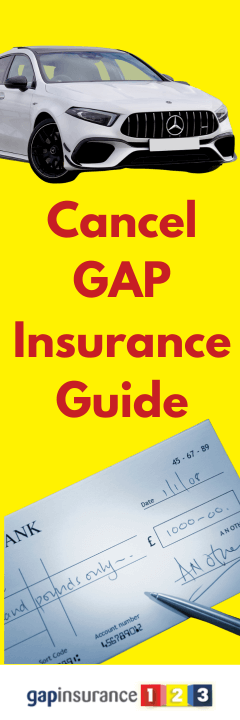Customer Service Lines open Monday- Friday 9am to 6pm
Please select some policies.



Need Help? Calling from a mobile please call 0151 647 7556
0800 195 4926Do you have a question? or need help?
Customer Service Lines open Monday- Friday 9am to 6pm,
GAP Insurance is a valuable financial safeguard for many car owners. You can typically buy GAP Insurance for an extended number of years. With Total Loss Gap, for example, this can be between 2 and 5 years.
You may intend to keep your car for the entire policy term. However, there may come a time when you no longer need it, or your circumstances change, and you decide to cancel your policy.
In this comprehensive guide, we'll explore the ins and outs of cancelling GAP Insurance, including factors to consider, the proper procedure, and potential pitfalls to avoid. We'll also address frequently asked questions on the subject.

Yes, you can cancel GAP Insurance. Knowing your options and understanding the cancellation process is essential, as circumstances may change during your finance agreement, hire purchase, or PCP finance deal.
There might even be cases where you opt for a cash buy of a new car and no longer require GAP Insurance. However, you may miss out on protection you did not realise you had. Here we provide the pros and cons of the cancellation process.
The cancellation process should be simple. Whether you buy GAP Insurance online or through a car dealership, this would be the same.
A cooling-off period is a legally mandated timeframe to change your mind and cancel your GAP Insurance policy without incurring any penalties. This period usually lasts 30 days from the date of purchase of the GAP Insurance.
If you decide to cancel within this timeframe, you'll typically receive a full refund. There should be no fees or penalties for doing so.
You must check your policy documentation for details on your specific cooling-off period, as terms and conditions may be attached. For example, if you have attempted to make a claim, even during your cooling-off period, you should not cancel the cover and will not get any refund.
If you have gone past your cooling-off period and then have the need to cancel your GAP Insurance policy, then what should you expect? Most GAP Insurance policies will be required to refund you if you cancel mid-term.
This may be subject to terms and conditions being met. One key term will typically be that you have yet to attempt to claim your GAP Insurance coverage.
In most cases, you won't be able to cancel your GAP Insurance policy if you've already made or attempted to make a claim. The policy's purpose has been fulfilled, and the insurer has provided the coverage you initially sought.
GAP Insurance is not a 'multi-claim' policy like alloy wheel cover or tyre insurance; once you have made a claim, that is the end of the Gap cover.
Refunds outside the cooling-off period are usually calculated pro-rata for the time left on cover, less a cancellation fee. Refunds are also calculated inclusive of Insurance Premium Tax.
This is not a simple yes or no because it depends on what type of finance agreement you had and which type of GAP Insurance you have.
We can split this question into two areas.
There are two circumstances where you should automatically cancel your GAP Insurance coverage as you can get no further benefit. These are:
However, there are circumstances where you can still benefit from having GAP Insurance coverage even though you no longer have a car loan on the vehicle. These include:
Where you took the vehicle out via hire purchase, personal contract purchase (PCP) or a personal loan and paid it off early, if you had taken a Return to Invoice GAP Insurance or a Vehicle Replacement GAP Insurance policy, even when you initially had finance, then you can still benefit. In the case of RTI GAP Insurance, you can claim back to the invoice price you originally paid. With VRI GAP Insurance, you can claim back the replacement cost.
When you pay off the finance early, the only difference is that your total car insurance settlement and the GAP Insurance top-up are yours. You simply have no finance to settle now.
So you have to keep your GAP Insurance in place and keep the more significant benefits it can provide.
In these cases, you should cancel your policy with the GAP Insurance company to ask them to refund GAP Insurance to you.
Cancelling your GAP Insurance policy is not always the best course of action. It's essential to weigh the pros and cons before making your decision. Here are some potential risks to consider:
Generally no. Your car insurance is a separate protection entirely. If you change your car insurance provider, then this should not impact your GAP Insurance as long as the type of motor insurance you have stayed the same.
When buying GAP Insurance, you usually must confirm that you have a fully comprehensive car insurance policy. Should this change, then you should contact your GAP Insurance provider to discuss the change.
So should you change from having fully comprehensive car insurance to any of the following, you should contact your GAP Insurance cover provider:
To confirm, changing your fully comprehensive motor insurance to one of many other car insurance companies providing the same fully comprehensive cover should not impact your gap coverage.

If you cancel your GAP Insurance policy within the cooling-off period, you should expect a full refund of your entire premium with no fees or penalties.
However, if you cancel after this period, the GAP Insurance refund amount will likely be pro-rated based on the time the policy has been in effect. This may also be subject to an administration or cancellation fee being deducted by the insurer.
If you have paid for your GAP Insurance premium via a credit agreement, you will have any outstanding finance settlement deducted from your GAP Insurance refund for unused coverage.
It's important to review your Guaranteed Asset Protection policy documentation and discuss your options with your insurance provider to determine the exact amount you're entitled to.
Sometimes, you can transfer your GAP Insurance policy to a new vehicle if you replace your current one. However, this depends on the specific terms and conditions of your policy. It's best to contact your insurance provider to discuss your options and any potential fees associated with the transfer.
Yes, you can generally cancel your GAP Insurance policy if you pay off your finance agreement, hire purchase, lease or PCP finance plan early. In this case, you may be eligible for a pro-rata refund, depending on the terms of your policy.
However, you must ensure you are not exposing yourself or missing out on a benefit. Make sure you read the terms and conditions of the policy carefully and contact your insurance provider if you have questions or would like to cancel.
It's essential to contact your insurance provider and follow the proper cancellation process to ensure a smooth transition.
You'll typically need to cancel your GAP Insurance policy if you sell your vehicle. In some cases, you might be able to transfer to your replacement vehicle, but this depends on your policy's specific terms and conditions. Contact your insurance provider to discuss your options and follow the proper cancellation or transfer process.
If you refinance your vehicle, your GAP Insurance policy might no longer be valid or necessary. Reviewing your policy documentation and contacting your insurance provider to discuss your options is crucial. You may cancel your current policy and purchase a new one that aligns with your updated finance agreement.
However, suppose your GAP Insurance product is a Return to Invoice or Vehicle Replacement Gap. In that case, you may still have significant benefits covered by leaving the current GAP Insurance coverage in place.
In conclusion, cancelling your GAP Insurance policy is an option to consider if your circumstances change or you no longer require coverage. However, weighing the potential risks in cancelling GAP Insurance cover is essential, as following the proper cancellation process ensures a smooth transition.
Remember to review your policy documentation, communicate with your insurance provider, and maintain a record of all correspondence. By taking these steps, you'll be well-equipped to make informed decisions about your GAP insurance coverage.
Updated 13/08/25, written by Mark Griffiths
Get a GAP Insurance Quote in minutes.
See all our GAP Insurance Guides.